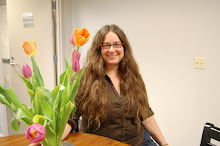This is the campus where I will be getting my MFA in Interdisciplinary Arts. It is the old Fort Warden grounds, in Port Townsend, Washington, which Goddard College rents for their Intensive Residency programs.
I love this place. I attended a week-long Jazz Composition and Arranging workshop there as a junior in high school. They hired a U.S. Marines band to play our compositions.
I have twice before applied to MFA programs. In 1994, I was accepted into the University of Oregon's MFA in Printmaking program. In 2004, I was a finalist at Yale's MFA in Theatre Directing program and had completed the interview before I withdrew. In both cases, I decided not to go.
I think what stopped me, in the end, is that neither one felt like software; neither the students and teachers were software developers. I am a hybrid. I am both a traditional artist and a software creator, to a professional level; and it has been my life's work to figure out how to create a life with these in it.
If I am creating anything, I want to be creating it with software developers. This is true even if the thing I am creating is a choir, or a theatre troupe, or a symphony, or a company. It is just as true, however, that if I am creating art, I want to be creating it to absolutely the highest standards of that art.
GODDARD'S MFA PROGRAM
The best fit I have found so far is a meta-program, Goddard College's MFA in Interdisciplinary Arts. This is a rigorously structured design-your-own-degree graduate program. It is perfect for someone who knows what they want, and wants to pursue it intensively.
Goddard was a traditional college for decades, before they decided to close their traditional programs and focus only on Intensive Residency programs. They had been the first to invent and pioneer the Intensive Residency model, with their legendary Creative Writing MFA. This spawned more than 40 similar programs in schools across the US and Europe. Thirty years later, Goddard decided to close their traditional programs and focus solely on Intensive Residency offerings. Their goal is to become the best Intensive Residency college in the world. "You are lucky you had such an immaculate record as a traditional college all those decades," said their accreditation board, "Or we would never let you do something like this."
This means I can stay in my house, in my life, working at my beloved DigiPen, and still get my degree. Every three weeks I submit a packet of work over the internet. Twice a year, all the faculty and students fly in for 8-day Intensive Residencies, during which we have showings, seminars, 1-on-1 meetings, semester reviews, and design the next semester's work. It is a two-and-a-half year program, three years with permission.
Goddard's focus and discipline is on whether you is following your own authentic artistic path. They do not care what medium you work in, or whether you move from one medium to another; they encourage your work to have a social component, as all art is connected to the world. They care strongly that you do the work; that you have intentional practices; that you do your work at a professional level; that you contextualize and articulate your work; that your work is authentic; and that you are establishing practices which will carry you as an artist for the rest of your life. Three years is not long in the life of an artist.
THE MFA IS A TERMINAL DEGREE
The MFA, Master of Fine Arts, is the terminal degree of the creative and performing arts. A PhD means you are an expert scholar of the field; an MFA means you are a virtuoso performer of the field. Concert pianists, painters, dancers, and writers get MFAs. In the academic world, scholars teach scholars, and performers teach performers. With a PhD in theatre, you teach theatre history. With an MFA in theatre, you teach acting or directing. An MFA in Interdisciplinary Arts is a good fit for the work I currently do, which is teaching game creators, in year-long project classes, how to make games.
I have noticed that people who truly long for an MFA or who truly long for a PhD, are always correct about their choice of degree. The PhD students profoundly love knowledge, research, scholarship. The MFA students profoundly love creating, in ever more skillful fashion. I don't think it matters which one you get, as long as you choose the one you love.
THE FOCUS OF MY MFA
This brings us to today, July 5, 2010. I have gotten the financial work done. I qualify for loans. I am half-way through my application. And I am walking around thinking deliciously about, "If I could do an MFA in anything, what would I do it in?"
I am definitely a creative artist. I have spent 40 years in these fields:
Music - 15 years
Dance/Choreography - 10 years + 8 years of sports
Art - 14 years
Writing - all my life
Theatre/Directing - 12 years formally, but grew up with it; wrote my first plays at age 8
Videogames/software - 30 years
High-performant ensemble creation - 13 years
I walk around thinking about this all the time:
What do I want from my MFA?
How shall I structure my MFA?
How can I involve DigiPen students in this?
What would be even better than that?















